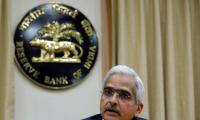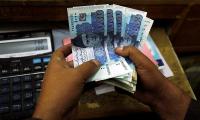ADB: IMF Deal to Boost Pakistan's Growth - Economic Reforms Key
The Asian Development Bank (ADB) says Pakistan's economic reforms supported by an IMF deal will accelerate growth and ease inflation. The report highlights the IMF's role in economic stability and the challenges ahead.
Islamabad, Sep 25 (PTI) The Asian Development Bank (ADB) said on Wednesday that Pakistan's economic reform agenda supported by the International Monetary Fund (IMF) was projected to accelerate growth and ease inflation in Pakistan.
In its Asian Development Outlook report for September, the Manila-based lending agency noted that growth in Pakistan had rebounded to 2.4 per cent in the fiscal year 2023-24, adding that the Fund's previous short-term USD 3 billion loan, which concluded in April, helped with economic stability in the country.
Pakistan and the IMF reached a three-year, USD 7 billion aid package deal in July, with the new programme, as stated by the report, to catalyse significant international financial support for the underlying economic stabilisation and reform programme.
Once approved by the IMF Executive Board, the arrangement should enhance macroeconomic stability, the ADB report stated, adding that the deal aimed to consolidate public finances, expand social spending and protection, rebuild foreign exchange reserves, reduce fiscal risks from state-owned enterprise, and improve the business environment to encourage growth led by the private sector.
However, the report warned that the country's economic outlook was still susceptible to high downside risks.
With Pakistan's sizeable external financing requirements, its economic outlook is vulnerable to any shortfall in external inflows, making timely disbursements from multilateral and bilateral partners crucial, the report read.
Furthermore, it cautioned that lapses in policy implementation could jeopardise the inflows, putting the exchange rate under pressure.
On the other hand, the report did acknowledge that the new government had committed to structural reforms, however, it faced challenges due to elevated political and institutional tensions and the prospects of social unrest from a steep drop in real incomes.
Devastating floods in 2022 demonstrated Pakistan's vulnerability to climate-induced natural disasters, further complicating the economic outlook, it stated.
On the external side, it noted geopolitical developments such as higher food and oil prices to be the main risks to the country's economic stability.
It added that the Fund's programme aimed to put the debt-to-GDP ratio on a sustainable declining path, highlighting that the budget deficit for the year was expected at 6.9pc of the GDP.
Regarding interest payments, it highlighted that they were expected to remain elevated for the year comprising about 57pc of the current expenditure and absorbing 75pc of the federal taxes.
Nevertheless, a disciplined fiscal stance is anticipated to significantly reduce these payments in the medium term, it added, meanwhile, stating that revenue measures and some reductions in interest outlay will be able to create the necessary fiscal space for much-needed social and development spending.
In its outlook report, the agency noted the country had made progress in re establishing a market-determined exchange rate.
General elections in February 2024 brought in a new coalition government in March 2024, alleviating political uncertainty that had prevailed since the start of the fiscal year, it added.
Regarding the central bank's role, the ADB said that the State Bank of Pakistan (SBP) had maintained an adequately tight monetary policy to meet its medium-term inflation target of 5 to 7pc.
The central bank has adopted a data-driven, forward-looking monetary policy framework, the statement read.
However, it cautioned that inflationary pressure was expected to rise due to the impact of fiscal measures in the finance bill, which included higher sales taxes on some items, and energy tariff adjustment required to ensure cost recovery in the energy sector.
In its Asian Development Outlook report for September, the Manila-based lending agency noted that growth in Pakistan had rebounded to 2.4 per cent in the fiscal year 2023-24, adding that the Fund's previous short-term USD 3 billion loan, which concluded in April, helped with economic stability in the country.
Pakistan and the IMF reached a three-year, USD 7 billion aid package deal in July, with the new programme, as stated by the report, to catalyse significant international financial support for the underlying economic stabilisation and reform programme.
Once approved by the IMF Executive Board, the arrangement should enhance macroeconomic stability, the ADB report stated, adding that the deal aimed to consolidate public finances, expand social spending and protection, rebuild foreign exchange reserves, reduce fiscal risks from state-owned enterprise, and improve the business environment to encourage growth led by the private sector.
However, the report warned that the country's economic outlook was still susceptible to high downside risks.
With Pakistan's sizeable external financing requirements, its economic outlook is vulnerable to any shortfall in external inflows, making timely disbursements from multilateral and bilateral partners crucial, the report read.
Furthermore, it cautioned that lapses in policy implementation could jeopardise the inflows, putting the exchange rate under pressure.
On the other hand, the report did acknowledge that the new government had committed to structural reforms, however, it faced challenges due to elevated political and institutional tensions and the prospects of social unrest from a steep drop in real incomes.
Devastating floods in 2022 demonstrated Pakistan's vulnerability to climate-induced natural disasters, further complicating the economic outlook, it stated.
On the external side, it noted geopolitical developments such as higher food and oil prices to be the main risks to the country's economic stability.
It added that the Fund's programme aimed to put the debt-to-GDP ratio on a sustainable declining path, highlighting that the budget deficit for the year was expected at 6.9pc of the GDP.
Regarding interest payments, it highlighted that they were expected to remain elevated for the year comprising about 57pc of the current expenditure and absorbing 75pc of the federal taxes.
Nevertheless, a disciplined fiscal stance is anticipated to significantly reduce these payments in the medium term, it added, meanwhile, stating that revenue measures and some reductions in interest outlay will be able to create the necessary fiscal space for much-needed social and development spending.
In its outlook report, the agency noted the country had made progress in re establishing a market-determined exchange rate.
General elections in February 2024 brought in a new coalition government in March 2024, alleviating political uncertainty that had prevailed since the start of the fiscal year, it added.
Regarding the central bank's role, the ADB said that the State Bank of Pakistan (SBP) had maintained an adequately tight monetary policy to meet its medium-term inflation target of 5 to 7pc.
The central bank has adopted a data-driven, forward-looking monetary policy framework, the statement read.
However, it cautioned that inflationary pressure was expected to rise due to the impact of fiscal measures in the finance bill, which included higher sales taxes on some items, and energy tariff adjustment required to ensure cost recovery in the energy sector.
You May Like To Read
TODAY'S MOST TRADED COMPANIES
- Company Name
- Price
- Volume
- Vodafone-Idea-L
- 11.65 (+ 3.56)
- 106772451
- Alstone-Textiles
- 0.28 ( -3.45)
- 44187760
- Mangalam-Industrial
- 0.88 ( -2.22)
- 39177573
- Sunshine-Capital
- 0.27 (+ 3.85)
- 35956340
- GMR-Airports
- 104.40 (+ 6.37)
- 30453005





